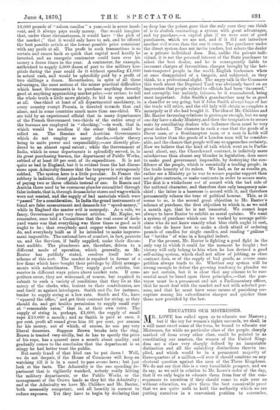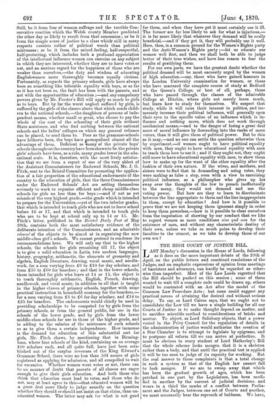EDUCATING OUR MISTRESSES.
MR. LOWE has called upon us to educate our Masters ; but if the cry for women's rights succeeds, we shall, in a still more exact sense of the term, be bound to educate our Mistresses, for while no particular class of the people, sharply marked off from every other class, could be pointed to as constituting our masters, the women of the United King- dom are a class very sharply defined by an immutable distinction and all the subsidiary distinctions therein im- plied, and which would be in a permanent majority of three-quarters of a million,—if ever it should combine on any electoral question against the men of the Three Kingdoms. We do not say that this is a very formidable prospect, and we do say, as we said in relation to Mr. Lowe's order of the day, that if we only begin to educate them from fear of the con- sequences to ourselves if they should come to rule over us without education, we give them the best conceivable proof that we are quite unfit to hold the authority which we are putting ourselves in a convenient position to surrender. Still, be it from fear of woman suffrage and the terrible Con- servative reaction which the Welsh county Member predicted the other day as likely to result from that concession ; or be it from the simple sense of justice to a class which still in many respects consists rather of political wards than political mistresses ; or be it from the mixed feeling, half-respectful, half-protecting, which includes both a profound appreciation of the intellectual influence women can exercise on any subject in which they are interested, whether they are to have votes or not, and an anxious regard for the happiness of those who are weaker than ourselves,—the duty and wisdom of educating Englishwomen more thoroughly becomes equally obvious. Fortunately, as regards the primary schools, girls have always been on something like tolerable equality with boys, or so far as it has not been so, the fault has been with the parents, and not with the opportunities of education ;—and any compulsory powers given by Mr. Forster's Bill will apply as much to girls as to boys. But by far the worst neglect suffered by girls, is suffered by the girls of the classes above that which sends child- ren to the national schools,—the daughters of persons of inde- pendent means, whether small or great, who choose to pay the whole of the cost of the schooling of their girls without State assistance, and who find nothing between the national schools and the ladies' colleges on which any general reliance can be placed, to send them to. Poor as the grammar-schools have hitherto been, the boys have 'monopolized almost all the advantage of them. Deficient as Inany of the private boys' schools throughout the country have been shown to be, the private girls' schools have been, as a rule, many grades lower in the edu- cational scale. It is, therefore, with the most lively satisfac- tion that we see from a report of one of the very ablest of the Assistant Commissioners for Endowed Schools, Mr. J. 0-. Fitch, sent to the Bristol Committee for promoting the applica- tion of a fair proportion of the educational endowments of the country to the education of girls, that the three Commissioners under the Endowed Schools' Act are setting themselves seriously to work to organize efficient and cheap middle-class schools for girls no less than for boys ;—and if not as yet schools of the very highest grade,—the grade which is intended to prepare for the Universities,—yet of the two inferior grades, that which is intended to teach girls who are not to leave school before 16 or 17, and that which is intended to teach girls who are to be kept at school only up to 14 or 15. Mr. Fitch's letter, published in the Bristol Daily Post of May 30th, contains both the most satisfactory evidence of the deliberate intention of the Commissioners, and an admirable résumé of the objects to be aimad at in organizing the new middle-class girl's schools. We cannot pretend to condense its recommendations here. We will only say that in the higher schools, the schools for girls remaining till 17, the object is to give a solid education in Latin, two modern languages, history, geography, arithmetic, the elements of geometry and algebra, English literature, drawing, vocal music, and needle- work, for a sum varying from £6 to £10 for day scholars, and from £35 to £60 for boarders ; and that in the lower schools, those intended for girls who leave at 14 or 15, the object is to teach thoroughly arithmetic, English, French, drawing, needlework, and vocal music, in addition to all that is taught in the higher classes of primary schools, together with some practical instruction in household economy for the boarders,— for a sum varying from £4 to £6 for day scholars, and £18 to £25 for boarders. The endowments would chiefly be used in providing scholarships to be competed for by girls from the primary schools, or from the general public, for use in the schools of the lower grade, and by girls from the lower middle-class schools for use in those of the higher grade, and in adding to the salaries of the mistresses of such schools so as to give them a certain independence. How immense is the demand for education of this substantial sort for girls, Mr. Fitch shows, by mentioning that in Birming- ham, where four schools of the kind, containing on an average 160 scholars each, and all quite full, have just been esta- blished out of the surplus revenues of the Sing Edward's Grammar School, there were no less than 501 names of girls registered as applying for admission, and all compelled to wait for vacancies. Whether women want votes or not, there can be no manner of doubt that parents of all classes are eager enough to give their girls education. And both those who think that education must lead to votes, and those who do not, may at least agree in this—that educated women will be a great deal more likely to judge soundly on the question whether they should or should not insist on that claim, than un- educated women. The latter may ask for what is not good for them, and when they have got it must certainly use it ill. The former are far less likely to ask for what is injurious,— it is far more likely that whatever they demand will be really beneficial,—and if they get it, they will probably use it well. Here, then, is a common ground for the Women's Rights party and the Anti-Women's Rights party ;—let us educate our women well first, and then we shall both be able to judge better of their true wishes, and have less reason to fear the results of gratifying them.
For our own parts, we have the greatest doubt whether the political demand will be most earnestly urged by the women of high education,—say, those who have gained honours in the London University examination for women, or those who have mastered the complete course of study at Bedford or the Queen's College, or best of all, perhaps, those who have passed through the classes of the admirable College at Hitchin, where girls not merely learn much, but learn how to study for themselves. We suspect that study, while it will raise their interest in politics, and im- mensely increase their political influence, will generally open their eyes to the specific value of an influence which is in- fluence and nothing more, which does not work through mechanical means,—and to the danger of losing a great deal more of moral influence by descending into the ranks of mere voters, than it will give them of political power. But be this as it may,—and no one can settle the question otherwise than by experiment,—if women ought to have political equality with men, they ought to have educational equality with men to teach them how to use it ; and if they ought not, they ought still more to have educational equality with men, to show them how to make up for the want of the other equality after the fashion of their own nature. If the wives, and mothers, and sisters were to find that in demanding and using votes, they were making as false a step, even with a view to exercising political influence, as a philosopher who gives up his sway over the thoughts of the few to preach ineffectually to the many, they would not demand and use the voting power. Bat how are they to learn to discriminate between the line appropriate to them and the line inappropriate to them, except by education ? And how is it possible to prove that we are not keeping them ignorant simply in order to keep them powerless,—how is it possible to clear ourselves from the imputation of showing by our conduct that we like to regard women as mere conditions sine qua non for the existence of men, and without any characteristic destiny of their own, unless we take as much pains to develop their faculties to the utmost, as we take to develop those of our own sex ?































 Previous page
Previous page